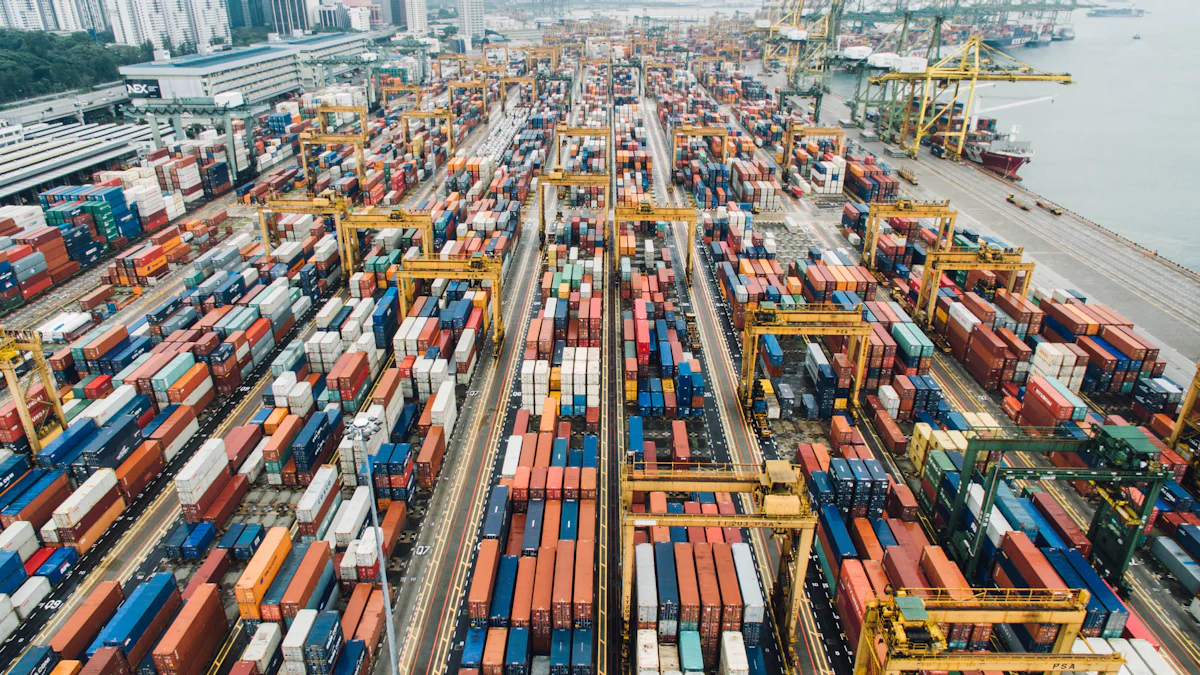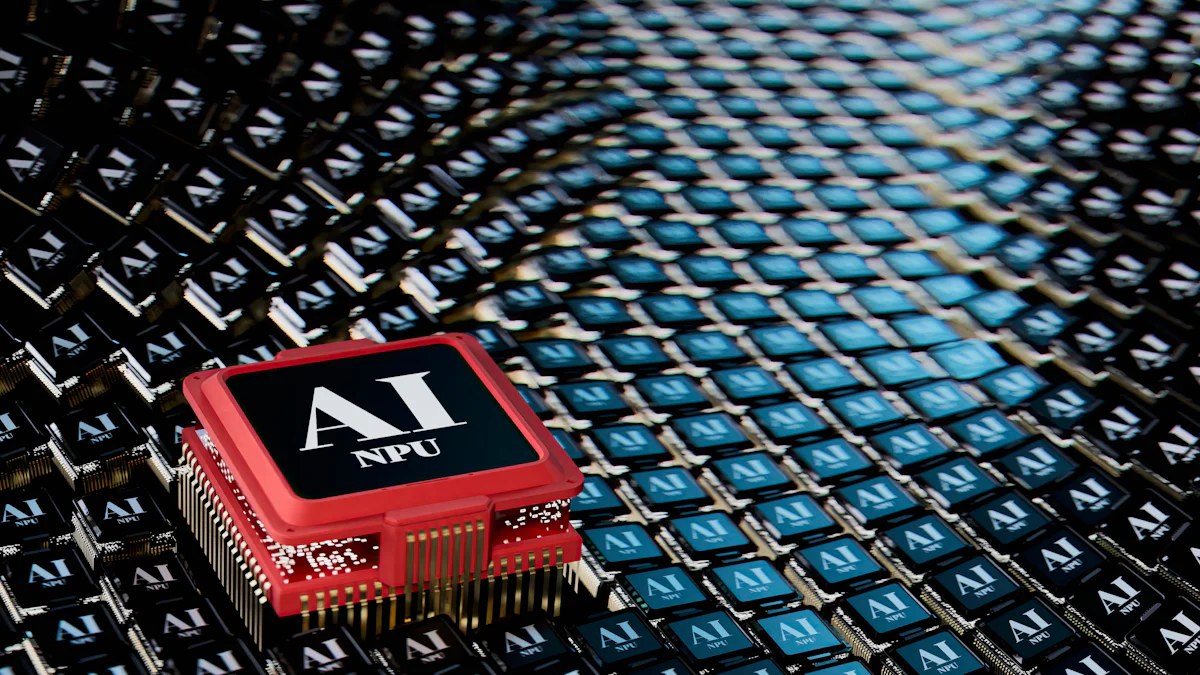AI Trends Transforming Supply Chain Management in 2025

Artificial Intelligence in 2025 supply chain operations will redefine efficiency and innovation. AI algorithms analyze vast datasets, optimizing transportation routes and reducing costs. By 2025, 38% of businesses will consider AI essential, with only 4% projected to operate without it. Automation technologies, such as robotic systems in warehouses, have already minimized human error and enhanced precision. These advancements strengthen supply chain resilience, enabling companies to adapt to disruptions and meet global demands. As AI adoption accelerates, businesses must leverage its potential to remain competitive in the evolving landscape of supply chain management.
The Role of Artificial Intelligence in 2025 Supply Chain

Enhancing Decision-Making with AI
Artificial intelligence in 2025 supply chain operations will revolutionize decision-making processes. AI tools will provide end-to-end visibility, enabling businesses to make faster and more accurate decisions. Generative AI will streamline procurement and sourcing by analyzing vast datasets and learning from patterns. Real-time data utilization will allow companies to track inventory and shipments, improving operational efficiency. AI will also enhance scenario planning by integrating historical and real-time data, enabling proactive responses to disruptions. Touchless planning will reduce manual intervention, increasing accuracy and efficiency. Furthermore, AI will address the skills gap by digitizing knowledge from experienced employees and training new talent.
Addressing Supply Chain Complexity
AI will play a pivotal role in managing the growing complexity of supply chain management. Companies like Church Brothers Farms have already used AI for real-time demand sensing, improving forecast accuracy and reducing waste. Similarly, Ducab implemented an AI-powered supplier portal to automate pre-screening and streamline supplier management. By 2025, AI will optimize manufacturing processes, as seen in the production of PAXLOVID, where cycle times were reduced by 67%. AI-powered route optimization systems will dynamically plan delivery routes, enhancing last-mile delivery efficiency across global operations. These advancements will simplify intricate networks in transport and logistics, ensuring seamless coordination.
The Shift Toward Data-Driven Operations
The transition to data-driven operations will redefine supply chain management. AI and advanced data analytics will enhance demand planning and forecasting, allowing businesses to adapt to unexpected demand fluctuations. Inventory optimization will become more precise, balancing stock levels to avoid overstocking or stockouts. Real-time data analysis will improve production planning and scheduling, ensuring efficient resource allocation. Predictive analytics will enable businesses to anticipate disruptions and adjust operations proactively. Additionally, AI-driven supply chain visibility will provide insights into demand patterns and disruptions, supporting proactive decision-making. These trends will empower companies to achieve greater efficiency and sustainability, reducing emissions and improving last-mile delivery.
Key AI Trends Shaping Supply Chain Management in 2025

Predictive Analytics for Proactive Decision-Making
Demand Forecasting and Inventory Optimization
Predictive analytics is revolutionizing supply chain management by enabling businesses to anticipate demand and optimize inventory levels. AI-driven tools analyze historical data and real-time market trends to forecast demand with remarkable accuracy. This capability allows companies to align production schedules and inventory levels, reducing costs associated with overstocking or stockouts. For example, Domino’s Pizza UK & Ireland has leveraged AI to enhance demand forecasting, improving customer satisfaction and operational efficiency. By 2025, predictive analytics will play a pivotal role in balancing supply and demand, ensuring seamless operations across industries.
Predicting Disruptions and Mitigating Risks
AI-powered predictive analytics enhances supply chain resilience by identifying potential disruptions before they occur. Machine learning algorithms assess supplier reliability, monitor equipment performance, and analyze external factors like weather or geopolitical events. This proactive approach enables businesses to mitigate risks and maintain operational continuity. IBM’s cognitive supply chain exemplifies this trend, achieving a 100% order fulfillment rate during the COVID-19 pandemic by leveraging AI and IoT. As predictive analytics continues to evolve, it will empower companies to navigate uncertainties with confidence.
Generative AI for Supply Chain Innovation
Automating Content Creation for Supply Chain Communication
Generative AI is transforming supply chain communication by automating content creation. AI systems generate reports, emails, and updates, streamlining communication across stakeholders. This automation reduces manual effort and ensures consistent messaging. Companies adopting generative AI report significant improvements in operational efficiency, with 78% utilizing it for customer service and 66% for process optimization. By 2025, generative AI will redefine how businesses communicate within their supply chains, fostering collaboration and transparency.
Designing New Supply Chain Models and Scenarios
Generative AI enables the design of innovative supply chain models by simulating various scenarios. It creates probabilistic models for inventory management, optimizing stock levels and reducing waste. Additionally, it aids in discovering new materials and improving manufacturing processes, promoting sustainability. UPS’s ORION system demonstrates the potential of generative AI, optimizing delivery routes and saving millions of gallons of fuel. These advancements will drive efficiency and sustainability in supply chain operations.
Advanced Automation and Robotics
AI-Powered Warehouse Automation
AI-powered robotics is revolutionizing warehouse operations by enhancing efficiency and accuracy. Autonomous robots perform tasks like sorting, picking, and packing, minimizing errors and reducing processing times. Amazon Robotics exemplifies this trend, utilizing AI-driven systems to streamline order fulfillment. Real-time inventory management further optimizes stock levels, ensuring timely replenishment. By 2025, AI-powered automation will become a cornerstone of warehouse management, delivering cost savings and improved customer satisfaction.
Autonomous Vehicles and Drones in Logistics
Autonomous vehicles and drones are reshaping logistics by enabling faster and more efficient deliveries. Self-driving trucks optimize long-haul transportation, while drones enhance last-mile delivery. Advancements in AI algorithms and 5G connectivity have improved vehicle coordination and response times. For instance, autonomous vehicles now play a critical role in healthcare, ensuring timely delivery of medical supplies. These innovations will reduce emissions and transform logistics into a more sustainable and efficient process.
AI-Driven Sustainability Initiatives
Optimizing Energy Use and Reducing Waste
AI-driven sustainability initiatives are reshaping supply chain management by reducing environmental impact and enhancing operational efficiency. AI tools analyze energy consumption patterns, enabling businesses to optimize energy use across manufacturing and logistics. For instance, AI systems can identify inefficiencies in transportation routes, reducing fuel consumption and emissions. Additionally, AI enhances waste reduction by improving demand forecasting and inventory replenishment. Automated replenishment ensures synchronization with real-time demand, minimizing overstocking and markdowns. Collaborative supply chain management further reduces waste by sharing forecasts and orders between retailers and producers. These strategies reflect a growing commitment to sustainability, helping businesses achieve their environmental goals while maintaining profitability.
AI reduces greenhouse gas emissions by 5% to 10% through insights into carbon footprints.
It limits power consumption and waste throughout the supply chain.
Optimized delivery routes cut fuel consumption and carbon emissions, supporting decarbonizing last-mile delivery efforts.
Enabling Circular Supply Chain Models
AI plays a pivotal role in enabling circular supply chain models, which prioritize resource reuse and waste minimization. By leveraging AI, businesses can track product lifecycles and identify opportunities for recycling or repurposing materials. AI-powered systems analyze data to optimize reverse logistics, ensuring efficient collection and redistribution of used products. These models reduce reliance on raw materials, lowering costs and environmental impact. Companies adopting circular supply chain models demonstrate their commitment to sustainability, aligning with global supply chain trends that emphasize eco-friendly practices. AI’s ability to integrate real-time data ensures seamless coordination, making circular supply chains a viable solution for modern businesses.
Real-Time Visibility and Tracking with AI
IoT Integration for End-to-End Monitoring
Integrating IoT with AI enhances supply chain visibility by providing real-time monitoring of inventory and operations. IoT sensors relay data about temperature-sensitive products, triggering alerts or adjustments to maintain product integrity. Retailers use AI for real-time inventory tracking, identifying replenishment needs and improving operational efficiency. Warehouses integrate data from multiple sources, offering a comprehensive view of inventory and processes. Intelligent routing and scheduling minimize delays and fuel consumption, reducing operational costs and emissions. These advancements streamline operations, ensuring timely deliveries and boosting customer satisfaction.
Customers may buy products, but what they are really buying is the entire experience. And that’s what they are judging a company on.
AI-Powered Digital Twins for Supply Chain Simulation
AI-powered digital twins revolutionize supply chain simulation by creating virtual replicas of physical systems. These digital models simulate process changes, predict outcomes, and optimize overall supply chain processes. Businesses use digital twins to test emergency responses, enhancing preparedness and stability. The technology identifies bottlenecks, enabling quick resolutions with minimal human intervention. Digital twins also optimize inventory management by integrating demand forecasting data, preventing stock-outs and reducing costs.
Benefit | Description |
|---|---|
Optimize Overall Supply Chain Processes | Enhances efficiency by simulating process changes and predicting outcomes. |
Improve Response to Emergencies | Allows firms to test actions during emergencies, enhancing preparedness and stability. |
Identify Bottlenecks | Provides an end-to-end view to spot and resolve bottlenecks quickly with minimal human intervention. |
Plan Transportation and Facilities | Optimizes planning by analyzing demand and supply fluctuations in real-time. |
Optimize Inventory Management | Prevents stock-outs and reduces costs by integrating demand forecasting data. |
AI-powered digital twins exemplify the transformative potential of AI in supply chain management, driving efficiency and innovation while reducing environmental impact.
AI is poised to revolutionize supply chain management by 2025, offering unparalleled opportunities for efficiency, innovation, and sustainability. Businesses that embrace AI integration will benefit from enhanced visibility, automation, and data-driven insights, enabling them to optimize processes and reduce costs. The economic impacts are significant, with AI reshaping labor forces, mitigating weather-induced disruptions, and addressing geopolitical challenges. Companies that fail to adopt AI risk operational inefficiencies, rising costs, and loss of market share. By leveraging data and AI, organizations can achieve end-to-end visibility, transforming supply chains into autonomous, highly efficient systems. Now is the time to invest in AI-driven solutions to secure a competitive edge in the evolving global market.
See Also
Exploring Five Key Trends Shaping Supply Chain Efficiency
Transforming Logistics: The Role of AI in Supply Chains
The Impact of Cloud Solutions on Supply Chain Dynamics
